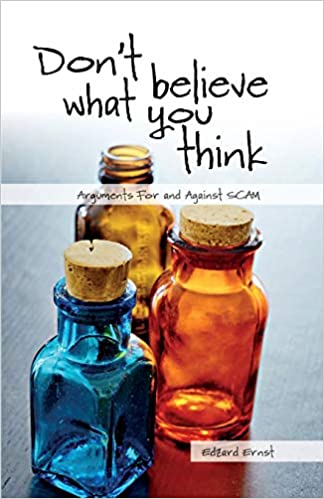 Edzard Ernst was once a practitioner of alternative medicine. As the world’s first professor of complementary medicine (at the University of Exeter, UK) he led a research team to scientifically investigate what worked and what didn’t and discovered that there was little or no evidence behind most of the claims of alternative medicine. Today he is arguably the world’s foremost expert on alternative medicine and has become its harshest and most prolific critic. I reviewed his autobiography A Scientist in Wonderland: A Memoir of Searching for Truth and Finding Trouble which tells the story of his transformation and the opposition he encountered.
Edzard Ernst was once a practitioner of alternative medicine. As the world’s first professor of complementary medicine (at the University of Exeter, UK) he led a research team to scientifically investigate what worked and what didn’t and discovered that there was little or no evidence behind most of the claims of alternative medicine. Today he is arguably the world’s foremost expert on alternative medicine and has become its harshest and most prolific critic. I reviewed his autobiography A Scientist in Wonderland: A Memoir of Searching for Truth and Finding Trouble which tells the story of his transformation and the opposition he encountered.
His output of books on so-called complementary and alternative medicine (SCAM) is impressive. I have reviewed several of them:
- Trick or Treatment: The Undeniable Facts about Alternative Medicine, which he co-authored with Simon Singh,
- Alternative Medicine: A Critical Assessment of 150 Modalities
- Homeopathy: The Undiluted Facts
- SCAM: So-Called Alternative Medicine
- More Harm Than Good: The Moral Maze of Alternative Medicine, which he co-authored with a medical ethicist.
His newest book is Don’t Believe What You Think: Arguments for and Against SCAM. It is, as he describes it, a crash course in critical thinking. And much more.

Why do people turn to alternative medicine?
Ernst explains,
Enthusiasts of SCAM tend to hope for fewer side effects, symptom relief, a cure for their condition, improvements in the quality of life, and protection from illness. Such high expectations are usually based on misinformation, often even on outright lies.
In this book, Ernst shows how consumers get manipulated into believing things that are evidently wrong. Those who advocate false beliefs, whether about climate change, evolution, or vaccines, rely on the same tactics:
- They ignore the scientific consensus.
- They cherry-pick their evidence.
- They rely on poor quality studies, opinion, and anecdotes.
- They invent conspiracy theories.
- They defame their opponents.
- They point out that science has been wrong before.
- They say, “science doesn’t know everything.”
He concisely and eloquently covers the psychology behind bias:
- Information overload: consumers are bombarded with untruths.
- Motivated ignorance: people choose to avoid disconcerting information.
- Motivated reasoning: finding reasons to defend a treasured belief regardless of evidence against it.
- Confirmation bias. This includes phenomena like anchoring, the bandwagon effect, Dunning-Kruger, illusory correlation, subjective validation, post-purchase rationalization, and others.
- Denialism: when confirmation bias degenerates into a complete denial of the truth.
After a general discussion of critical thinking, he gets into particulars. In each of 35 essays he addresses a commonly held belief or argument about SCAM and demolishes it with reasoning and scientific evidence. Here’s a sampling:
“I have done my research”
How often have we heard this? But research doesn’t mean what they seem to think it means. What they have done is more properly called “exploration.” Research should be systematic. This “research” was not systematic: they looked at randomly chosen websites, articles, videos, and/or books, and then uncritically accepted the views that appealed to them. After their exploration, some of them favor an “integrative” approach, thinking that will achieve the best of both worlds. Ernst provides the text of an announcement about Integrative Cancer Therapy (ICT) from a German academy claiming that ICT is holistic, addresses the patient’s personal needs, provides individualized treatments, and other claims. He numbers the claims 1 through 10, and comments on each of the claims by number, based on reliable research. His comments:
- Actually, this describes conventional oncology!
- Actually, this describes conventional oncology!
- Actually, this describes conventional oncology!
- Actually, this describes conventional oncology!
- Actually, this describes conventional oncology!
- Actually, this describes conventional oncology!
- Actually, this describes conventional oncology!
- Actually, this describes conventional oncology!
- Actually, this describes conventional oncology!
- Actually, this describes conventional oncology!
SCAM frequently tries to co-opt conventional treatments such as exercise and pretends they are discoveries of SCAM.
SCAM is natural
All SCAMS claim to be natural, but are they really? Thinking critically makes one question what is natural about ear candles, homeopathy’s Berlin Wall remedy, naturopathy’s neural therapy (injection of a local anesthetic), chiropractic’s moving joints outside their natural range of motion, etc.
SCAM can save us all a lot of money
The arguments supporting this claim are all fallacious. Most of the published studies (and there are a lot of these) show that SCAM use causes extra expense.
SCAM providers offer sound advice
There is plenty of evidence that much of their advice is not just poor, but also dangerous, and sometimes even life-threatening. Ernst encourages readers to search for their own examples, which are easy to find.
This study proves…
Sometimes a study finds bizarre results that can’t be attributed to any obvious flaws. It may have been replicated, but it may not have been an independent replication but have been done by the same original authors. There are four possibilities: fraud, coincidence, undetected bias, or the study is correct and the previous consensus was wrong. The last possibility is the least likely: one anomalous study can’t overturn decades of previous research.
SCAM practitioners don’t diagnose disease
They may say they don’t diagnose, but in reality they use a variety of bogus diagnostic methods including dowsing, applied kinesiology, iridology, Kirlian photography, live blood analysis, pulse diagnosis, tongue diagnosis, and the Vega test and similar variants of electroacupuncture according to Voll (EAV). These have all been tested and have been thoroughly debunked.
Imaginary dialogs
SCAM proponents will find reasons to deny the evidence and will argue about everything in this book. Ernst has a wealth of experience countering their arguments and has unique insight into their thinking. He presents imaginary dialogs between a scientist and a proponent of SCAM that are very true to life and illuminate the conflict.
Conclusion: Don’t believe what you think
This is a very useful, insightful, well-written book that is packed with reliable, science-based information. If you have believed any of the misinformation about SCAM, this book might change your mind. If you are not a believer, it may give you good tools to help you explain to believers that what they think they know is based on misinformation. Whatever you think about SCAM, don’t believe what you think. Think again and start doubting your belief. As Feynman said, “The first principle is that you must not fool yourself and you are the easiest person to fool.”

